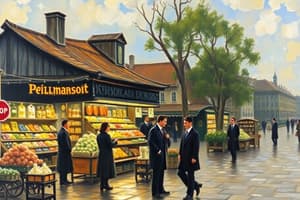Podcast
Questions and Answers
What does commerce primarily involve?
What does commerce primarily involve?
- The regulation of financial markets
- The storage of goods in warehouses
- The exchange of goods and services on a large scale (correct)
- The production of goods in factories
Which of the following is NOT a component of commerce?
Which of the following is NOT a component of commerce?
- Advertising (correct)
- Finance
- Trade
- Distribution
What distinguishes e-commerce from traditional commerce?
What distinguishes e-commerce from traditional commerce?
- E-commerce occurs over the internet (correct)
- E-commerce does not involve financial transactions
- E-commerce relies solely on physical storefronts
- E-commerce is more expensive to operate
What is a key advantage of commerce in society?
What is a key advantage of commerce in society?
Which type of commerce describes transactions between a business and a consumer?
Which type of commerce describes transactions between a business and a consumer?
Which of the following defines 'supply and demand'?
Which of the following defines 'supply and demand'?
What is a challenge associated with e-commerce?
What is a challenge associated with e-commerce?
Which modern trend in commerce emphasizes ethical practices?
Which modern trend in commerce emphasizes ethical practices?
Study Notes
Definition of Commerce
- Commerce refers to the exchange of goods and services, particularly on a large scale.
- It encompasses all activities related to buying, selling, and trade.
Components of Commerce
-
Trade:
- Involves the actual buying and selling of goods and services.
- Can be classified into:
- Domestic Trade: Trade within a country.
- International Trade: Trade between different countries.
-
Distribution:
- Process of delivering goods from the producer to the consumer.
- Involves logistics, transportation, and supply chain management.
-
Finance:
- Involves the management of money related to commercial transactions.
- Includes banking, investment, and credit flows.
-
Insurance:
- Risk management tool to protect against financial loss in commerce.
Types of Commerce
-
E-commerce:
- Buying and selling of goods and services over the internet.
- Subcategories:
- B2C (Business to Consumer)
- B2B (Business to Business)
- C2C (Consumer to Consumer)
-
Traditional Commerce:
- Involves physical exchanges and storefronts.
- Utilizes traditional marketing and sales methods.
Importance of Commerce
- Facilitates economic growth and development.
- Provides employment opportunities.
- Enhances interdependence among different regions and countries.
- Drives innovation through competition.
Key Concepts
- Supply and Demand: Fundamental economic model describing how price can vary based on the balance between supply available and demand from consumers.
- Market Structure: Includes various systems such as monopoly, oligopoly, and perfect competition that dictate market behavior.
- Consumer Behavior: Study of how individuals make decisions about the purchase of goods and services.
Modern Trends in Commerce
- Increased digitalization and automation.
- Focus on sustainability and ethical sourcing.
- Rise of social commerce and influencer marketing.
- Shift towards remote shopping experiences (e.g., online marketplaces).
Challenges in Commerce
- Globalization complexities, including tariffs and trade agreements.
- Cybersecurity threats in e-commerce.
- Regulatory compliance and ethical considerations in marketing.
By understanding these components, concepts, and trends in commerce, individuals and businesses can navigate the marketplace more effectively.
Definition of Commerce
- Commerce involves the exchange of goods and services, especially on a large scale.
- It covers all activities related to buying, selling, and trading.
Components of Commerce
- Trade: buying and selling of goods and services.
- Domestic Trade: within a country.
- International Trade: between different countries.
- Distribution: delivering goods from producer to consumer.
- Involves logistics, transportation, and supply chain management.
- Finance: managing money related to commercial transactions.
- Includes banking, investment, and credit flows.
- Insurance: risk management tool to protect against financial loss in commerce.
Types of Commerce
- E-commerce: buying and selling of goods and services over the internet.
- B2C: Business to Consumer.
- B2B: Business to Business.
- C2C: Consumer to Consumer.
- Traditional Commerce: involves physical exchanges and storefronts.
- Uses traditional marketing and sales methods.
Importance of Commerce
- Facilitates economic growth and development.
- Provides employment opportunities.
- Enhances interdependence among different regions and countries.
- Drives innovation through competition.
Key Concepts
- Supply and Demand: describes how price varies based on the balance between supply and demand.
- Market Structure: includes systems like monopoly, oligopoly, and perfect competition that dictate market behavior.
- Consumer Behavior: studies how individuals make purchase decisions.
Modern Trends in Commerce
- Increased digitalization and automation.
- Focus on sustainability and ethical sourcing.
- Rise of social commerce and influencer marketing.
- Shift towards remote shopping experiences (online marketplaces).
Challenges in Commerce
- Globalization complexities, including tariffs and trade agreements.
- Cybersecurity threats in e-commerce.
- Regulatory compliance and ethical considerations in marketing.
Studying That Suits You
Use AI to generate personalized quizzes and flashcards to suit your learning preferences.
Description
Explore the fundamental concepts of commerce, including trade, distribution, finance, and insurance. This quiz covers various types of commerce, such as domestic, international, and e-commerce. Test your understanding of these essential components and their roles in the economy.




